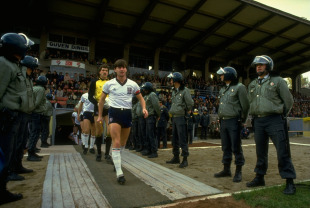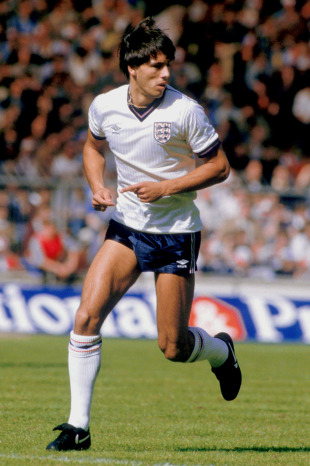- Rewind to 1984
When the Young Lions were king of the jungle

England begin their latest Under-21 European Championship campaign on Sunday, against one of the favourites for the tournament, Spain. In something of a quirk of fate, the two sides met last time the Young Lions actually won the tournament, back in 1984, when they retained the crown they had previously claimed two years earlier. We look back on that two-legged final...
It's hard to imagine, but once upon a time England were something of a force at Under-21 level.
In 1982, in just the third iteration of the U-21 European Championships, Dave Sexton's side overcame a 4-0 defeat to Romania in their opening group game and then a vociferous Bremen crowd in the second leg of the final to actually win the title, seeing off West Germany 5-4 on aggregate despite a late Pierre Littbarski hat-trick at the Weserstadion.
On that occasion, it was Gary Owen (twice), Justin Fashanu, Mike Duxbury and Paul Goddard who grabbed the goals for the Young Lions, although it was the other German to get on the score-sheet during the tie, Rudi Voller, who walked away with the 'Golden Player' award for the player of the tournament.
Two years later, and Sexton was still at the helm but many of the faces had changed. Paul Bracewell, Steve Hodge, Mel Sterland and John Barnes were just a few names who became regulars immediately after the graduation of the prior class - and only Barnes (who quickly progressed to full honours) would not see the entire campaign out.
Another player within the squad was Mark Hateley, a young Coventry City striker who had scored twice on his debut to help England through the quarter-finals in 1982, but found himself out of the team by the time the second leg of the semi-final had come around that year.
But 1984, following a transfer to Portsmouth, was to be a different matter. England lost just once in qualification (to Greece) ahead of the 1984 competition, enjoying home-and-away triumphs over both Hungary and Denmark, before Hateley grabbed four goals in an opening 6-1 demolition of France in the quarter-finals at Hillsborough.
He scored the only goal of the rather meaningless second leg, too, as England eased into a semi-final match-up with Italy. Hateley was forced to miss the first game of that contest but England coped anyway, with Sterland - showing himself to be a full-back of uncanny goalscoring touch and a wicked set-piece ability - getting his second of the tournament as Hateley's de-facto replacement, Mitch D'Avray, scored on his debut to give the Young Lions a 3-1 first leg lead.
The Azzurrini got one of those goals back in Florence, but Sexton's men nevertheless held firm to ensure they returned to the final and a gave themselves a great chance to retain their title.
There they would meet Spain, who contained future heroes of the full squad like Emilio Butragueno and Andoni Zubizarreta.
The first leg was held in Seville, in front of 30,000 partisan fans at the Ramon Sanchez Pizjuan, yet Sexton could only pick a side that counted central defender Dave Watson as its most experienced player (10 previous caps at the level).
Paul Bracewell, Gary Stevens and Steve Hodge also counted among the senior members of the side selected, while Hateley accounted for seven of the 12 goals the first XI had previously scored at the level.
Attacking threat, then, looked like a real problem - especially when Hateley was forced off after just 20 minutes, replaced by the dutiful D'Avray.
During the campaign, however, right-back Sterland had emerged as an unlikely goalscoring threat for Sexton's side - and the Sheffield Wednesday youngster took advantage of a lull in the action shortly after the restart to fire home a shot that would prove the difference at the final whistle.

The attention would thus turn to Bramall Lane, where England only needed to draw to retain their title. Sexton modified his lineup to withdraw the relatively inexperienced Queens Park Rangers goalkeeper Peter Hucker (who had kept a clean sheet in the first leg) to reinstate Manchester United's more experienced Gary Bailey between the sticks (David Seaman - who would have more impact than both in the senior ranks - was only a few months from supplanting the pair), handed a debut to Everton's Derek Mountfield and returned Watford's pacey Nigel Callaghan to the right-wing.
Significantly, he kept Birmingham City's Howard Gayle as one of his 'over-age' players that were allowed at the time to partner Hateley upfront, despite his lack of a goal in his two prior appearances.
None of those moves were defensive, however, as England attacked from the off despite the precarious position. By half-time, however, neither side had managed a breakthrough. Then, early in the second half, Hateley popped up and made the decisive contribution of the tie and tournament.
"Callaghan swung in a ball from the right and I caught it first time on a volley and it screamed into the top corner," Hateley later recalled.
A beautiful strike it was, and it was body blow that the Spanish simply couldn't cope with. Three minutes later, Gayle repaid his manager's faith and doubled the advantage against a shell-shocked opponent. From there England were able to cruise to victory - and, unlike in 1982, Hateley ensured an English player was also able to claim the UEFA Golden Player award.
Not that he celebrated his success.
"After the game, the press interviews and what have you, I was straight back down the road [to Portsmouth]," he noted. "At the time I don't think I really acknowledged how big an achievement it was.
"You're plugging away and concentrating on getting in the first team at your club and hoping you can get into the Under-21s and playing regularly, which means you get a bigger chance of retaining your place in the first team at your club.
"And you want to catch people's eye - playing at that level can be a springboard for your whole career."
It certainly was for Hateley, who left Portsmouth after just one season at Fratton Park for Italian giants AC Milan. Successful spells at AS Monaco and Rangers would follow - not to mention full England honours.
Winning the U-21 Championships didn't make him a better player, and least not demonstrably so, but it certainly brought his talent to more widespread attention and enabled his career to really take off.
"I'd imagine that's how a lot of young players still look at it," he said. "I was just focusing on getting as high as I could up that ladder - every young England player has that dream."
What happened next?
The players that represented the U-21s, in both legs, went on to claim a total of 93 caps at full international level. 56 of those came courtesy of Hateley and Hodge, who were arguably the only ones to make the transition to the highest level.
Two years later, three members of the winning squad (Hateley, Hodge and Stevens) graduated to Bobby Robson's 23-man group for the World Cup in Mexico. If anything, their presence was a reminder that prominence in the U-21s is no guarantee of similar success with the Three Lions - although Hodge did at least snaffle the shirt of a certain Diego Maradona after that famous quarter-final exit.
A lesson the 2011 group of U-21s may or may not yet learn - but in the meantime perhaps they can follow in the footsteps of the class of 1984.

